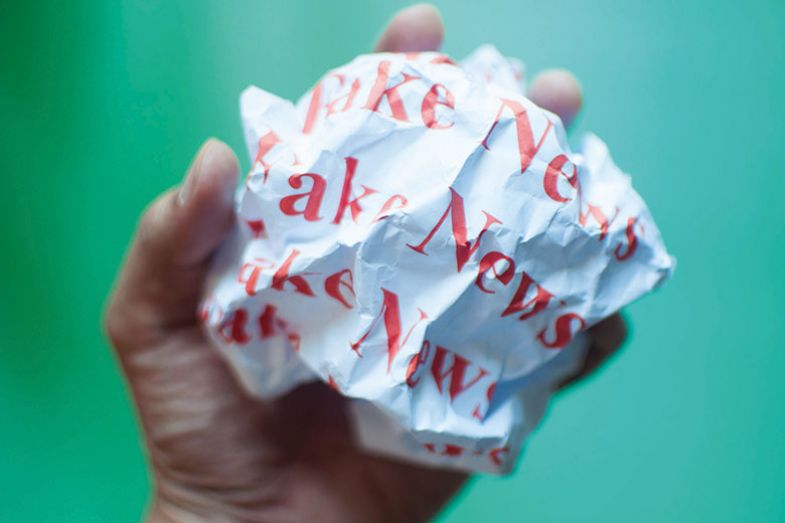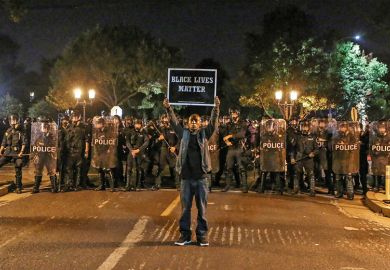In Denial, Keith Kahn-Harris cites Peter Pomerantsev (whose Nothing is True and Everything is Possible: Adventures in Modern Russia should be required reading) on the current eruptions of “spouting shit, the joy of pure emotion, often anger, without any sense”. He explores the cluster of issues around “post-truth”, fake news, conspiracies and false scholarship through the idea of “denialism”. Whether these are a reiteration of older problems or new difficulties, they call for more scholarly work and public engagement. Kahn-Harris certainly deserves credit for trying, but his book fails at the ambitious task it sets itself.
As far as I can reconstruct the argument from its convolutions and sweeping generalisations, Kahn-Harris believes that there is a stultifying moral consensus about what we can and can’t say. On a personal level, we are not allowed to express our desires (except we do: “Please can I have a cup of coffee?”; “Would you like to go out on a date with me?”). But what if our wider political desires include “values, ideologies that cannot be openly spoken of”? What if we want to let the world burn in eco-catastrophe or wish to murder a whole people? Then we turn to denialism for self-expression. For Kahn-Harris, denialists are just “regular people in an impossible situation” and he enjoins us to admire the passion and courage in their defiance of the norms. They are not liars (except when he admits they are): they are “builders”, “innovators”, full of “effervescent creativity”. Dreamers of a world they wish to see. Denial is – he writes repeatedly – a thrill.
This is especially relevant to readers of Times Higher Education because denialism in this book seems to mean anything “against the general consensus”: Holocaust and climate change denial, anti-vaxxers, flat-earthers and more. Since a consensus is usually developed from and supported by scholarship, so denial often apes and is seen to be “opposed” to conventional scholarship (just as the-moon-is-made-of-blue-cheesers are “opposed” to astronomers).
In a sense, this is a restatement of one of the fundamental problems of Western thought: how can you differentiate real speech and real reason (Plato called this philosophy) from sophistry that looks like it but isn’t? Kahn-Harris suggests it can be hard to spot the difference between denial and proper knowledge. But you know what? Most deniers are not Theaetetus facing off with the Stranger from Elea in front of Socrates in the Athenian agora: it’s not really so hard to tell.
This is because Kahn-Harris’ argument is just nonsense. Denial is neither heroic nor a version of a normal human predicament. Denial is specialised lying, propaganda or foolishness. Holocaust denier David Irving was judged by the court to have “persistently and deliberately misrepresented and manipulated historical evidence”; climate change denial, with its origins in the fight for big tobacco (“doubt is our business”), is corporate shillery; flat-earthers claim to have adherents around the globe. The risk of denial is not that we fail to admire its thrills and kicks but that it is often the sinister misleading the silly on the most serious issues.

Kahn-Harris is astonished that denialism keeps sprouting despite persistent debunking, but this is because he pays little attention to different forms of language use. A liar (even one with footnotes) in an argument with a historian or a medical scientist debating a newspaper columnist (who sells attention-grabbing opinions for money) is simply not speaking the same language, nor following the same rules of engagement. Both hate speech and propaganda pass by reasoned argument: this is a serious but not new problem, and not special to denialism. And, of course, denial keeps springing up because there are always liars for kudos and money (and op-ed writers). This is why debunking, despite being repetitive, boring work (like weeding), is so vital. Undertaken by academics, often those in the public eye, and by the many excellent science and fewer humanities journalists, it is a significant and valuable part of public engagement and even (though it’s not cool to defend it) of impact, too. Kahn-Harris says debunking doesn’t work, but, in fact, in the case of Holocaust denial, he himself shows that it does: it’s just not glamorous or thrilling labour in the garden of ideas.
Something else ignored by Kahn-Harris is the fact that language doesn’t just represent but often performs what it says. Holocaust denial is not a mask for antisemitism, it is antisemitism; anti-vax rhetoric is not a cover for opposition to public health, it is that very opposition. (Incidentally, these are all reasons why out-of-fashion deconstruction, with its acute interest in exactly what kind of language is being used and why, is not an ally of denial but an implacable foe.)
His solution to the issues of “moral differences” and so for denialism in general is that we all say what we feel. So in what he claims is his central chapter he ventriloquises the case for the genocide of the Jewish people and for global ecocide. And, if that wasn’t unnecessary enough, in passing he also contradicts his entire thesis by admitting that the “denier’s alternative” to the consensus wasn’t really hidden by denial at all but was simply “staring me in the face”. Well, yes.
Finally, without wishing to sound too much like an academic version of one of Bertie Wooster’s more offensive maiden aunts, but – oh my goodness – the scholarly apparatus. One must forgive the publisher’s error of the out-of-sequence footnotes, and clearly dodgy websites are legitimate sources in this case but…the seemingly random sources; the citations taken out of chronological or argumentative context; flimsy blogs or op-eds taken for weighty disputation. It isn’t the case of cutting the detail for the general reader, either. This is important not only because of what computer scientists used to call “garbage in, garbage out” but also because, as denialists shoddily copy scholarship, scholarship on denial needs to be as careful as possible.
What led Kahn-Harris to find noxious denial so thrilling, creative and valuable? Perhaps the answer lies in his earlier research into heavy metal. There is a powerful and moving song by The Mountain Goats called The Best Ever Death Metal Band in Denton. Schoolboys Cyrus and Jeff call their band “Satan’s fingers” in an appropriately teenage exhilarating, innocent and thoroughly metal fashion. But as a consequence they find themselves terribly punished by the authorities, who crush their dreams and send Cyrus away. While it is good for academics to develop the insights of art, art can also lead them disastrously astray, as perhaps metal has here. Holocaust deniers, corporate propagandists and anti-vaxxers are not teenage boys playing rock in a garage, sticking a finger up to the Man: they must not be treated as such. This is a childish category error that flatters them. Deniers are at worst vicious liars who risk the lives of many and at best gullible fools whose silliness is to the detriment of us all.
Robert Eaglestone is professor of contemporary literature and thought at Royal Holloway, University of London. His books include Postmodernism and Holocaust Denial (2001) and, most recently, The Broken Voice: Reading Post-Holocaust Literature (2017).
Denial: The Unspeakable Truth
By Keith Kahn-Harris
Notting Hill Editions, 200pp, £14.99
ISBN 9781910749968
Published 13 September 2018
The author
Keith Kahn-Harris is a senior lecturer at Leo Baeck College and an associate lecturer at Birkbeck, University of London. He has also taught or held fellowships at universities in Australia, Finland, Germany, Israel and Sweden as well as a number of British institutions.
After completing a PhD in sociology on the global extreme metal scene, Kahn-Harris has written largely on heavy metal and conflict within the British Jewish community. As well as a number of edited collections on music, popular culture and religion, he has published four books (before this most recent one): Extreme Metal: Music and Culture on the Edge (2006), Turbulent Times: The British Jewish Community Today (with Ben Gidley, 2010), Judaism: All That Matters (2012) and Uncivil War: The Israel Conflict in the Jewish Community (2014). He has produced a number of research reports for Jewish institutions and organisations devoted to interfaith dialogue, and is working on a collection uniting the diverse central strands of his research, on Jews and heavy metal.
In 2011, Kahn-Harris embarked on a crowdfunded book provisionally titled The Best Water Skier in Luxembourg: Tales of Big Fish in Small Ponds. The aim, he told Times Higher Education at the time, was to investigate “the politics of small worlds – many of them riven by factionalism – and how people pursue excellence, and find meaning and pleasure and community within them”.
The initial work on the project was “enormous fun”, and he hoped to interview local celebrities such as “the top bassoonist in Finland, the most powerful politician on St Helena, the greatest living Surinamese novelist and the greatest living expert on Cornish”. However, it eventually proved impossible to secure all the funding required for the travel and research.
Matthew Reisz
POSTSCRIPT:
Print headline: Liars, liars, pants on fire
Register to continue
Why register?
- Registration is free and only takes a moment
- Once registered, you can read 3 articles a month
- Sign up for our newsletter
Subscribe
Or subscribe for unlimited access to:
- Unlimited access to news, views, insights & reviews
- Digital editions
- Digital access to THE’s university and college rankings analysis
Already registered or a current subscriber?








